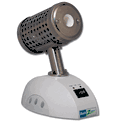Benchmark Scientific Autoclaves - Sterilizers
Typical loads include laboratory glassware, other equipment and waste, surgical instruments and medical waste. A notable growing application of autoclaves is the pre-disposal treatment and sterilization of waste material, such as pathogenic hospital waste. Machines in this category largely operate under the same principles as conventional autoclaves in that they are able to neutralize potentially infectious agents by utilizing pressurized steam and superheated water. A new generation of waste converters is capable of achieving the same effect without a pressure vessel to sterilize culture media, rubber material, gowns, dressing, gloves, etc. It is particularly useful for materials which cannot withstand the higher temperature of a hot air oven. Benchmark Scientific now offers 2 different autoclaves available in 4 liter and 16 liter sizes. Benchmark Scientific autoclaves are competitively priced compare to the equivalent products in the market.

- MFR#: BMS-B1000
The Benchmark Scientific BactiZapper B1000 is a portable sterilizer that uses infrared technology to create high temperature upto 815°C (1500°F) for sterilization of ...
Usually ships in 3-4 Business DaysMSRP:$501.23$426.05 - MFR#: BMS-B4000-M
Benchmark Scientific BioClave Mini is a mini sized autoclave that has an 8 liter capacity. It's a very convenient benchtop autoclave for labs, clinics and hospitals with limited bench space.
Usually ships in 3-4 Business DaysMSRP:$5,453.38$4,635.37 - MFR#: BMS-B4000-18
The BioClave 18 is a larger size autoclave/sterilizer that Benchmark Scientific added to its line of products. With its 18 liter capacity chamber size, The BioClave 18...
Usually ships in 1-2 weeksMSRP:$7,544.90$6,413.17 - MFR#: BMS-B4000-28-220
With similar operation to the BioClave Mini and BioClave 16, the new 28 liter model features an increased chamber size with a diameter of 32cm. With this larger internal chamber, the BioClave 28 is our only model capable of sterilizing 1 and 2 liters flasks (and bottles).
Usually ships in 3-4 business daysMSRP:$13,894.55$11,810.37
















